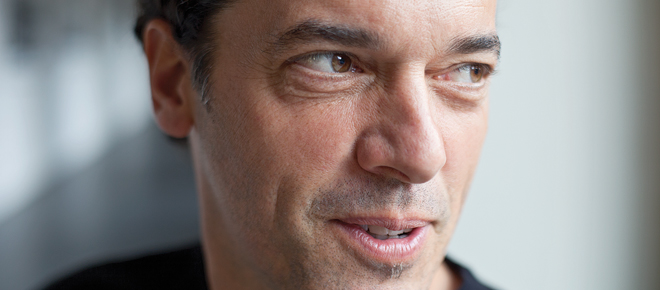Joseph Boyden explains why readers must wait for the end of his trilogy
‘It seemed like the right time for a story I grew up in,’ the novelist says of the book he wrote instead. (Click here for an excerpt)
Andrew Tolson
Share

It wasn’t supposed to unfold this way. Joseph Boyden shot into CanLit stardom eight years ago with his Great War novel, Three Day Road, and followed it up in 2008 with the Giller prize-winning Through Black Spruce. Ever since, readers have been waiting for the last volume in a trilogy that will span over a century in the lives of a Cree family. Instead they now have The Orenda, an extraordinarily vivid novel set during a brief, violent and historically decisive moment in 17th-century Ontario, told in the entwined voices of a Huron warrior, an Iroquois girl and a French Jesuit. “It seemed like the right time for a story I grew up immersed in,” says Boyden, 46, who spent summers as a child on Christian Island in Georgian Bay, where many Hurons fled in 1649, and attended Brébeuf College, named for the Jesuit martyr. “Even if I did my best to get kicked out of that school—right down to a Mohawk haircut—I think my Jesuit education stuck.”
Key scenes kept insinuating themselves into his consciousness, Boyden continues, especially the harrowing opening, which he likes to call “a 17th-century car chase, except on snowshoes.” A handful of Hurons have tracked and slaughtered a party of starving Iroquois. Now burdened with a “crow”—that is, a black-robed Jesuit—and an Iroquois child they decide to keep for adoption, the Hurons are themselves being pursued by a larger group of their enemies, whose baying dogs are close enough to be audible through the frozen air. The entire scene, which seems a mere incident in a long-running and increasingly bloody conflict, is in fact full of touch-and-go moments, all of them pregnant with implications, not just for the rest of Boyden’s plot, but for the future of North America.
But the insistent voices of his characters were not the only factor involved, Boyden allows. His Giller win and, he adds, his Maclean’s articles on life in post-Katrina New Orleans—one of the Toronto-born author’s two adopted homes (he spends his summers among the James Bay Cree of Northern Ontario)—have made him a public intellectual. As a novelist, the part-Metis Boyden had always focused on the “big part played in my life by the small part of my ancestry that is Native.” In recent years, with newly easy access to the media, he has been outspoken about his passionate interest in Aboriginal issues. “In Orenda I wanted to show that there were brilliant, self-contained worlds here—civilizations—when the Europeans came, to provide, as well as a story, a subtle education.”
And to tackle head-on the brutality of killing and torture in the Huron-Iroquois wars. Boyden lays out the cultural, even spiritual meaning of the extremes of cruelty involved, carefully mirroring Native practices with European norms of the day. “The first torture scene is what happens to that rapist in New France,” Boyden points out. How his story would be received among contemporary Hurons was another major concern. Boyden flew to Ottawa from New Orleans, with the traditional gift of tobacco, to speak with Georges Sioui—a historian at the University of Ottawa, one of four brothers whose 1990 Supreme Court case was a landmark in First Nations legal rights, and a respected Huron elder. “Basically I was seeking his blessing,” says Boyen, candidly and remarkably for a modern novelist, “and he gave it to me.”
With this book out of his head and onto the page, Boyden can now turn back to his trilogy. Part of the final volume will be set during the Canadian army’s bitter Second World War Italian campaign, and may well mark a further evolution in the author’s focus. Christophe, Boyden’s main Jesuit in The Orenda—modelled on the historical figure of St. Jean de Brébeuf—“is the first Western character I’ve ever written about in depth,” Boyden says. The Italian setting may bring more. That’s where Boyden’s father, Raymond, the most decorated Canadian doctor of the war, won his Distinguished Service Order. The author is noncommittal whether his father will make a fictionalized appearance, but the odds are he will. Joseph Boyden likes to spin his personal connections into intricate historical universes, and he has an exceptionally rich legacy to mine.